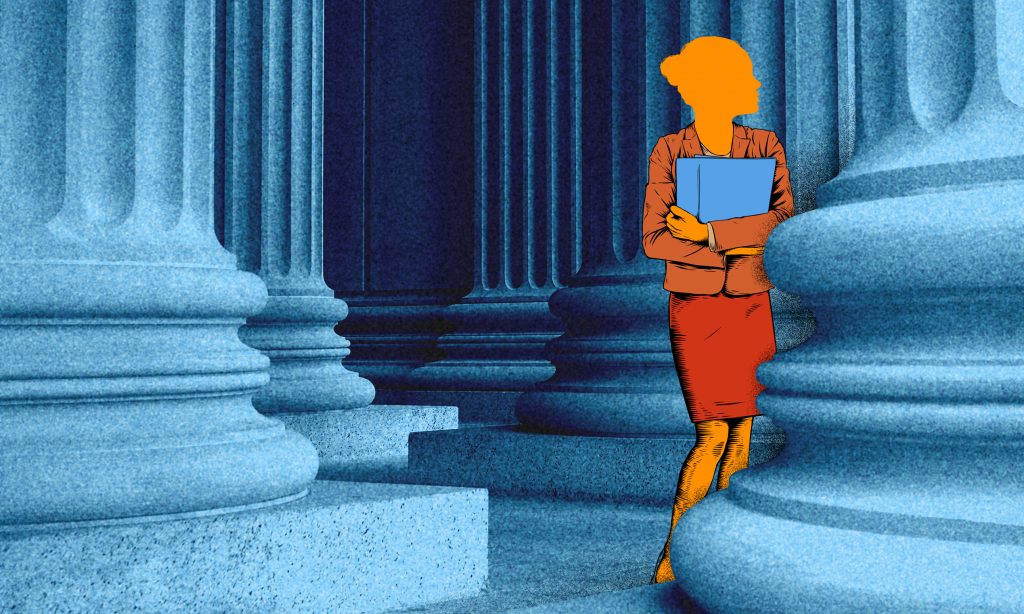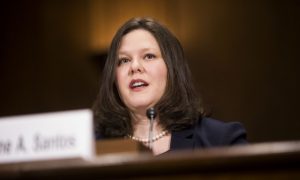After Reinhardt Clerk's Testimony, Federal Judiciary Faces Renewed Calls to Address Sexual Harassment
"After carefully reviewing the applicable procedures for reporting harassment, Ms. Warren did not feel that she could safely report to the Ninth Circuit," the clerk's attorney, Zainab Ahmad of Gibson, Dunn & Crutcher, said in a statement.
March 25, 2020 at 10:00 AM
13 minute read
The original version of this story was published on National Law Journal

Olivia Warren's testimony before the House Judiciary's courts subcommittee was kept under wraps until the last moment. It wasn't until minutes before the 8:30 a.m. hearing that her name appeared on the list of witnesses and her testimony was made available.
That testimony revealed bombshell allegations of sexual harassment by the late Judge Stephen Reinhardt, who Warren clerked for on the U.S. Court of Appeals for the Ninth Circuit. But she made it clear she was not primarily there to make her claims about Reinhardt. Instead, she wanted to draw attention to the issues she had in reporting the revered judge's conduct.
"As I will explain, the frustrations and obstacles I encountered in those efforts led me to make the difficult decision to testify today," Warren said in her written testimony from Feb. 13.
It's that perspective advocates seized on in the weeks after Warren's hearing. Law students are demanding the federal judiciary, and sometimes their own schools, take action now to protect them from potentially unsafe situations. Those outside of the judiciary, including the House Judiciary Committee, are left questioning whether recent reforms adopted by the judicial branch go far enough in addressing the issue.
"Yes, there is absolutely work that has been done that's way faster than I would have expected. But I worry that the changes that have been made are more superficial," said Jaime Santos, co-founder of the group Law Clerks for Workplace Accountability, and a partner at Goodwin Procter. "Changing the culture and making people feel comfortable reporting is so much harder. And that's the part that hasn't really come close to being mastered yet."
Hallowed Halls
Among the first to formally call for action after Warren's testimony was a coalition of groups from prominent law schools demanding the judiciary do more to protect employees, including clerks.
 Jaime A. Santos, Counsel with Goodwin Proctor, testifies before the Senate Judiciary Committee during a hearing titled "Confronting Sexual Harassment and Other Workplace Misconduct in the Federal Judiciary," on June 13, 2018.
Jaime A. Santos, Counsel with Goodwin Proctor, testifies before the Senate Judiciary Committee during a hearing titled "Confronting Sexual Harassment and Other Workplace Misconduct in the Federal Judiciary," on June 13, 2018."We write on behalf of law students who believe that the federal judiciary has responded inadequately to widespread misconduct and are concerned that the judiciary is not a safe working environment," the students from Harvard, Stanford and Yale wrote in a Feb. 24 letter to Chief Justice John Roberts and the chief judges of the 13 federal appeals courts.
A clerkship at a prestigious court or with a notable judge can elevate the career of those just starting off in law. Becoming a clerk with a "feeder" judge at a district or circuit court can lead to a coveted U.S. Supreme Court clerkship, and access to an elite professional network that provides opportunities to work in Big Law or in other prestigious legal positions.
But the power dynamics within a clerkship, or inside a courthouse, are like few other professional settings. Judges wield enormous influence and power because of their positions. And clerks put in long hours working closely in chambers with their judge. While not often the case, the unique dynamics open the door to potential abuse by a judge or other forms of misconduct.
Judiciary staff point to the lengths they've gone to create and adopt reforms in recent years. They single out a Judicial Conference working group on conduct, composed of federal judges and senior court officials. The group formed in early 2018 in response to allegations against Alex Kozinski, then a judge on the U.S. Court of Appeals for the Ninth Circuit, to help move courts in the right direction in addressing inappropriate behavior.
One of their recommendations was the the creation of an Office of Judicial Integrity, a national office where judiciary staff can anonymously seek guidance on what resources are available to them and find out how to formally report instances of harassment or other misconduct.
The outside groups acknowledge the judiciary has taken steps on the topic. But recent headlines from Warren's testimony, as well as a years-long investigation into Carlos Murguia, who resigned in February as a federal trial judge in Kansas over allegations of sexual harassment, are raising new questions and demands for answers.
Leah Litman, a professor at the University of Michigan, was among the former law clerks to accuse Kozinski of sexual harassment. She said she believes the reaction to the Reinhardt allegations "has been the same or worse than the response to the allegations against Judge Kozinski."
"People are refusing to honestly and publicly reflect on how different people, institutions, and networks enabled the judge's misconduct," Litman said. "And it is disappointing that this same omission is happening again because people are still too scared or just unwilling to have that conversation."
Not 'a Lot of Faith'
Student group leaders who spoke with The National Law Journal raised concerns about what situations they could face if they chose to enter the judiciary, through a clerkship or otherwise, and how exactly they could go about reporting the issues. And they're pushing for reforms to be implemented now.
They drew particular attention to the possibility of retaliation if they file a complaint against a prominent judge or staffer in their circuit, and the lasting impact that could have on their careers.
"The person responsible for investigating their complaint is the chief judge of their circuit, who is inevitably going to have a close and professional relationship with whoever the accused judge is," said Emma Janger, a Harvard Law School student and co-founder of the People's Parity Project, a nonprofit that pushes for more protections for judiciary staff.
Each circuit has its own procedures on how to handle instances of misconduct: For example, the U.S. Court of Appeals for the D.C. Circuit announced in February a new employment dispute resolution plan in line with the working group's recommended plan.
Warren, the former Reinhardt clerk, raised similar concerns in her testimony, describing how she weighed her different options in determining whether to report her allegations. She ultimately came forward once she had a job outside of the judiciary, and after the judge's passing.
"After carefully reviewing the applicable procedures for reporting harassment, Ms. Warren did not feel that she could safely report to the Ninth Circuit," Warren's attorney, Zainab Ahmad of Gibson, Dunn & Crutcher, said in a statement. "Although the procedures technically allowed her to report anonymously, the substance of her complaint would have made her identity obvious to the Ninth Circuit judges and administrators. She also worried that these procedures would not protect her from retaliation—something she had already witnessed and something she feared deeply."
Those concerns about retaliation were underscored by a Feb. 26 letter to the editor in the Los Angeles Times by Cathy Catterson, the former circuit executive for the Ninth Circuit, who said she worked closely with Reinhardt for decades.
"I cannot speak personally to the recent testimony by a former law clerk who told of her eight-month experience in chambers to a House Judiciary subcommittee. I regret that she believed this was the best way to air her grievances, almost two years after Judge Reinhardt's death," Catterson wrote.
Groups like the People's Parity Project are calling for the judiciary to start an independent office to handle misconduct complaints nationally and for a national workplace climate survey. The latter is a solution included in the best practices outlined in 2016 by the Equal Employment Opportunity Commission.
The federal judiciary's misconduct working group hasn't ruled out a climate survey, but has not committed to one. The judiciary also stands by its system of having individual circuits handling misconduct claims for the meantime, pointing to new positions created for the courts that don't leave judges as the sole investigators for misconduct claims.
In the meantime, advocates for clerks say they are encouraging people to use the reporting systems that have been adopted by the judiciary, but their faith in those procedures is wavering.
"It is difficult to encourage people to use those processes when the failure in Liv's case is so evident," said Deeva Shah, co-founder of Law Clerks for Workplace Accountability, and an associate at Keker, Van Nest & Peters. "We keep encouraging people to talk to the institutional coordinators that they have. But I don't think that people have a lot of faith, unfortunately."
A Work in Progress
On Feb. 18, days after Warren's testimony, Administrative Office of the Courts Director James Duff sent a memo all judiciary employees on behalf of the workplace conduct working group.
 Judge Stephen Reinhardt of the U.S. Court of Appeals for the Ninth Circuit.
Judge Stephen Reinhardt of the U.S. Court of Appeals for the Ninth Circuit."The testimony reinforced the need for the steps the judiciary has taken over the past 24 months to promote culture change and awareness, as well as the provision of additional resources for addressing workplace concerns within our branch," Duff wrote of Warren's testimony. "The hearing also underscored the need to ensure that wrongful conduct in the workplace is reported and discovered so that it may be addressed appropriately."
"We will continue to review our workplace protection policies, practices and procedures and refine them as necessary to ensure that employees feel comfortable and protected from retaliation when they seek to redress conduct issues," he continued.
That message is indicative of the judiciary's general response to criticism over the reforms: They've come a long way, but it's still a work in progress.
The Judicial Conference in 2019 adopted a package of workplace reforms, including amendments to the Code of Conduct and other rules that clarify that misconduct includes sexual harassment. Those changes were recommended by the conduct working group. Official complaints are handled by individual circuits. Critics say that raises significant conflict of interest issues, as courts can be insular communities.
Jill Langley, the first and sole officer of judicial integrity at press time, advises judiciary employees who want to learn about courts' policies on misconduct or how to make an official complaint. She cannot start the official complaint process, but says she works with those employees to direct them to the person on their circuit who can best handle formal complaints should they decide to pursue them.
Langley said all circuits now have directors of workplace relations or employees in similar roles, who are set apart from the normal workflow of a circuit. The idea is to lessen potential conflicts of interest when investigating misconduct.
Margaret Wiegand, the circuit executive for the U.S. Court of Appeals for the Third Circuit and a member of the judiciary's working group on workplace misconduct, said the recently added director at her circuit has been traveling to district courts and other local offices that fall under the scope of the judiciary to introduce herself as a resource if issues arise.
"There are options besides just an internal court investigation," Langley said, adding that courts can also hire outside law firms if needed.
Langley said she is frequently on the phone with judiciary staff to field questions, follow up on previous calls and figure out the best way to handle a complaint, whether it's an informal resolution she can help facilitate or start a more official process.
Another area of focus is education. Langley said judges are generally committed to improving their courts and Langley sees her role as part of that effort.
"Everyone I meet, I say, 'You call me the second you think you're experiencing something,'" she said. "'You let me know if you think that's happening because you have a right to file a claim, you have a right to get that shot.'"
The judiciary is eyeing an expansion of Langley's office, requesting funding to hire two more staffers. A judiciary spokesperson said the working group is considering the future of the office, but did not provide any further details.
Capitol Hill Ups the Ante
While advocates push for the judiciary to take more action, Capitol Hill is also upping the pressure. In the wake of Warren's testimony, there's talk of legislation that would require the judiciary to adopt some of the proposals advocates want.
Lawmakers have indicated they aren't buying the effectiveness of the reforms. In March, a bipartisan group of House Judiciary Committee members criticized what the judiciary has done to address misconduct, saying the measures "continue to fall short."
The lawmakers, including House Judiciary Committee Chairman Jerry Nadler and Rep. Jim Sensenbrenner, described the judiciary's approach to addressing sexual harassment as resulting in a "patchwork of policies across the different judicial circuits and with limited options for reporting outside of an employee's immediate environment, calling into question the ability to report violations confidentially."
Outside advocates hope Congress can come up with bipartisan approaches to misconduct at the judiciary. Signs indicate that they're headed in that direction.
As for the judiciary, Wiegand says the misconduct working group is still meeting, and reevaluating the current policies in place to determine any next steps.
Advocates in the meantime hope the issues raised in Warren's testimony will keep their push for institutional change moving forward.
"I think it's very easy to focus on the individual actions of a judge," said Shah, the Law Clerks for Workplace Accountability co-founder. "But the cost here is that because people have really been focusing on the individual actions of the judge, they've been ignoring the failures of the system as a whole."
This content has been archived. It is available through our partners, LexisNexis® and Bloomberg Law.
To view this content, please continue to their sites.
Not a Lexis Subscriber?
Subscribe Now
Not a Bloomberg Law Subscriber?
Subscribe Now
NOT FOR REPRINT
© 2025 ALM Global, LLC, All Rights Reserved. Request academic re-use from www.copyright.com. All other uses, submit a request to [email protected]. For more information visit Asset & Logo Licensing.
You Might Like
View All

LA-Area Law Firms Offer Support as Region Reckons With Raging Wildfires

Once the LA Fires Are Extinguished, Expect the Litigation to Unfold for Years
5 minute read
'Not the President's Personal Lawyer': Lawyers Share Concerns Over How AG Pick Bondi’s Loyalism to Trump May Impact DOJ
6 minute readLaw Firms Mentioned
Trending Stories
Who Got The Work
J. Brugh Lower of Gibbons has entered an appearance for industrial equipment supplier Devco Corporation in a pending trademark infringement lawsuit. The suit, accusing the defendant of selling knock-off Graco products, was filed Dec. 18 in New Jersey District Court by Rivkin Radler on behalf of Graco Inc. and Graco Minnesota. The case, assigned to U.S. District Judge Zahid N. Quraishi, is 3:24-cv-11294, Graco Inc. et al v. Devco Corporation.
Who Got The Work
Rebecca Maller-Stein and Kent A. Yalowitz of Arnold & Porter Kaye Scholer have entered their appearances for Hanaco Venture Capital and its executives, Lior Prosor and David Frankel, in a pending securities lawsuit. The action, filed on Dec. 24 in New York Southern District Court by Zell, Aron & Co. on behalf of Goldeneye Advisors, accuses the defendants of negligently and fraudulently managing the plaintiff's $1 million investment. The case, assigned to U.S. District Judge Vernon S. Broderick, is 1:24-cv-09918, Goldeneye Advisors, LLC v. Hanaco Venture Capital, Ltd. et al.
Who Got The Work
Attorneys from A&O Shearman has stepped in as defense counsel for Toronto-Dominion Bank and other defendants in a pending securities class action. The suit, filed Dec. 11 in New York Southern District Court by Bleichmar Fonti & Auld, accuses the defendants of concealing the bank's 'pervasive' deficiencies in regards to its compliance with the Bank Secrecy Act and the quality of its anti-money laundering controls. The case, assigned to U.S. District Judge Arun Subramanian, is 1:24-cv-09445, Gonzalez v. The Toronto-Dominion Bank et al.
Who Got The Work
Crown Castle International, a Pennsylvania company providing shared communications infrastructure, has turned to Luke D. Wolf of Gordon Rees Scully Mansukhani to fend off a pending breach-of-contract lawsuit. The court action, filed Nov. 25 in Michigan Eastern District Court by Hooper Hathaway PC on behalf of The Town Residences LLC, accuses Crown Castle of failing to transfer approximately $30,000 in utility payments from T-Mobile in breach of a roof-top lease and assignment agreement. The case, assigned to U.S. District Judge Susan K. Declercq, is 2:24-cv-13131, The Town Residences LLC v. T-Mobile US, Inc. et al.
Who Got The Work
Wilfred P. Coronato and Daniel M. Schwartz of McCarter & English have stepped in as defense counsel to Electrolux Home Products Inc. in a pending product liability lawsuit. The court action, filed Nov. 26 in New York Eastern District Court by Poulos Lopiccolo PC and Nagel Rice LLP on behalf of David Stern, alleges that the defendant's refrigerators’ drawers and shelving repeatedly break and fall apart within months after purchase. The case, assigned to U.S. District Judge Joan M. Azrack, is 2:24-cv-08204, Stern v. Electrolux Home Products, Inc.
Featured Firms
Law Offices of Gary Martin Hays & Associates, P.C.
(470) 294-1674
Law Offices of Mark E. Salomone
(857) 444-6468
Smith & Hassler
(713) 739-1250






